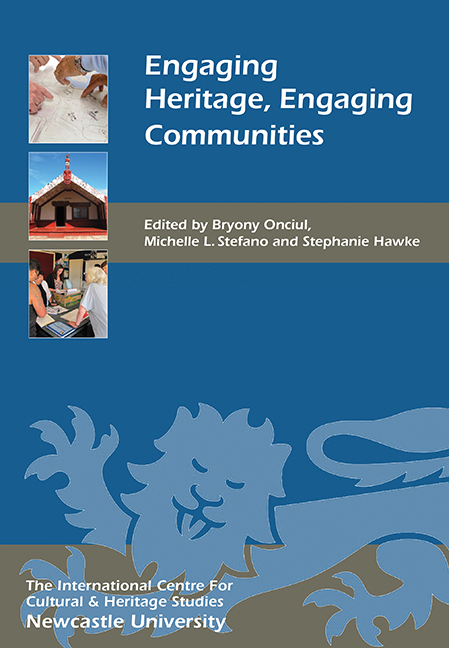Book contents
- Frontmatter
- Contents
- List of Illustrations
- Acknowledgments
- Introduction
- Engaging Concepts
- 1 The Gate in the Wall: Beyond Happiness-making in Museums
- 2 Assembling Communities: Curatorial Practices, Material Cultures and Meanings
- 3 Interview – John Tunbridge
- 4 Interview – Gregory Ashworth
- 5 Engaging with Māori and Archaeologists: Heritage Theory and Practice in Āotearoa New Zealand
- 6 Horizontality: Tactical Politics for Participation and Museums
- Engaging Creatively
- Engaging Challenges
- List of Contributors
- Index
- Miscellaneous Endmatter
3 - Interview – John Tunbridge
from Engaging Concepts
Published online by Cambridge University Press: 13 April 2017
- Frontmatter
- Contents
- List of Illustrations
- Acknowledgments
- Introduction
- Engaging Concepts
- 1 The Gate in the Wall: Beyond Happiness-making in Museums
- 2 Assembling Communities: Curatorial Practices, Material Cultures and Meanings
- 3 Interview – John Tunbridge
- 4 Interview – Gregory Ashworth
- 5 Engaging with Māori and Archaeologists: Heritage Theory and Practice in Āotearoa New Zealand
- 6 Horizontality: Tactical Politics for Participation and Museums
- Engaging Creatively
- Engaging Challenges
- List of Contributors
- Index
- Miscellaneous Endmatter
Summary
Could you say something about your career so far, focusing on community engagement with heritage?
My research commitment to heritage began 40 years ago, when I realised that this then rather novel concept had important practical implications for differing valuations of places and was accordingly emerging as a very significant variable in geography, my home discipline. My first heritage publications concerned the geographical impact of conservation trusts, notably the British National Trusts, for which community engagement was implicitly at the national level – though in those days that meant primarily the white middle-class community. Before long, however, it became clear that communities identifying with a heritage not only existed at every scale from global to local but were liable to be divided on one or another parameter at every scale, so that the real issue was plural – that is, communities’ engagement with heritages. My little paper on ‘Whose heritage to conserve?’ (Tunbridge 1984) was among the first recognitions of divided heritages in divided communities and has acquired a landmark status, having been republished many years later (somewhat to my embarrassment). Dissonant Heritage (Tunbridge and Ashworth 1996) has a stronger claim on landmark status, and is largely concerned with the depressingly wide range of variables which give rise to heritage dissonance by dividing what we loosely term communities. This theme is further developed in A Geography of Heritage (Graham et al 2000) and arguably climaxes in Pluralising Pasts (Ashworth et al 2007), which recognises not only the ethnic and related plurality of so many societies and their heritage values in the contemporary world but also the concomitant spectrum of official degrees of heritage recognition that exists – of which the multicultural ideal is merely the most generously inclusive extreme case.
How would you define heritage?
The crucial question! Heritage is the selective use of historical resources for contemporary purposes, be they economic, social or political. As such it is fluid, volatile and typically plural – even to the point of being specific in detail to every individual. It is about meanings – NOT about tangible or intangible relics from the past, which are the prime resources from which heritages are derived but are not in themselves ‘heritage’.
- Type
- Chapter
- Information
- Engaging Heritage, Engaging Communities , pp. 47 - 50Publisher: Boydell & BrewerPrint publication year: 2017



